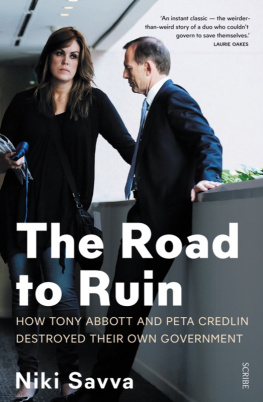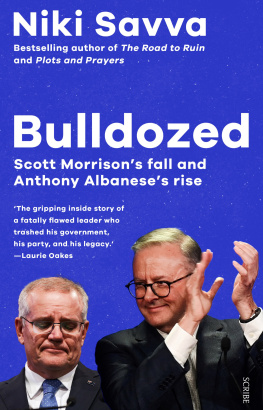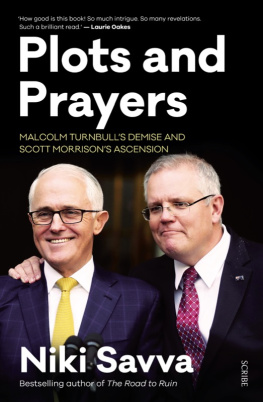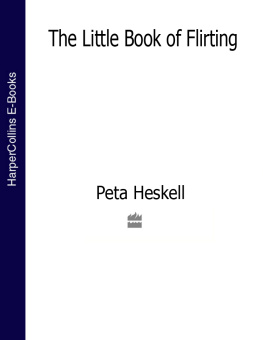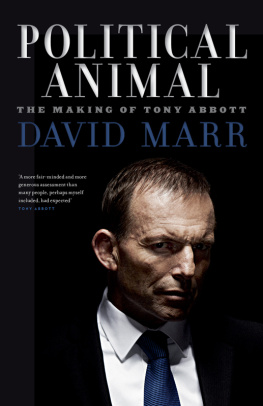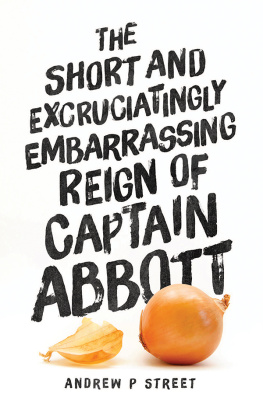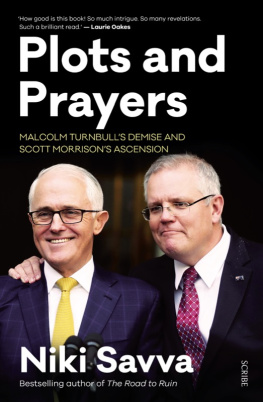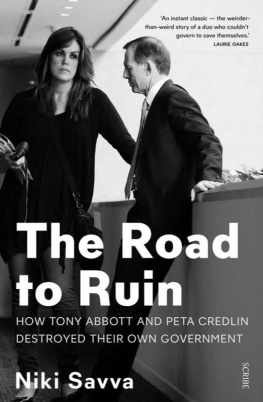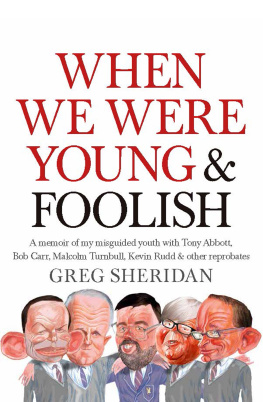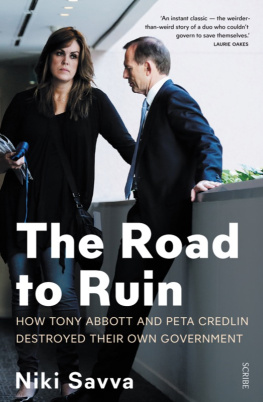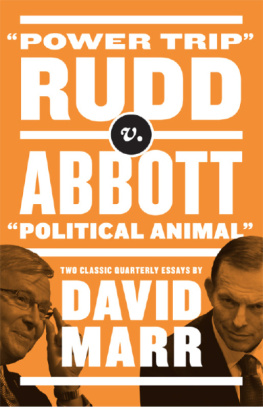
THE ROAD TO RUIN
Niki Savva is one of the most senior correspondents in the Canberra Press Gallery. She was twice political correspondent on The Australian , and headed up the Canberra bureaus of both the Herald Sun and The Age . When family tragedy forced a career change, she became Peter Costellos press secretary for six years and was then on John Howards staff for three. Her work has brought her into intimate contact with the major political players of the last 35 years. She is now a regular columnist for The Australian , and often appears on ABC TVs Insiders as well as on political panels on Sky News.
Scribe Publications Pty Ltd
1820 Edward St, Brunswick, Victoria 3056, Australia
Scribe Publications UK Ltd
2 John St, Clerkenwell, London, WC1N 2ES, United Kingdom
First published by Scribe 2016
Reprinted 2016 (three times)
Copyright Niki Savva 2016
All rights reserved. Without limiting the rights under copyright reserved above, no part of this publication may be reproduced, stored in or introduced into a retrieval system, or transmitted, in any form or by any means (electronic, mechanical, photocopying, recording or otherwise) without the prior written permission of the publishers of this book.
9781925321401 (paperback)
9781925307542 (e-book)
A CiP entry for this title is available from the National Library of Australia
scribepublications.com.au
scribepublications.co.uk
For Andreas and Elpiniki,
whose courage made everything possible
Contents
one/
two/
three/
four/
five/
six/
seven/
eight/
nine/
ten/
eleven/
Prologue
On the night of 15 July 2014, The Australian marked its 50th birthday with a star-studded celebration (is there any other kind?) at Sydneys Hordern Pavilion.
The prime minister, Tony Abbott, was standing near my seat at my designated table, talking to The Australian s editor-at-large, Paul Kelly. As I approached him, the prime minister called out cheerily: Niki, how are you?
Instantly, my protective radar went up. The last time I had seen him, a few months before, at a drinks function in the cabinet anteroom for women in the media, he could barely bring himself to speak to me. I found out later that my invitation, and that of fellow columnist Grace Collier, had been prompted by Sophie Mirabella over drinks, after a dinner in Mirabellas honour a few nights before.
As I was standing near the entrance to the anteroom with the ABCs Alex Kirk, Abbott hadnt been able to avoid me, but it was like trying to talk to a block of wood. His face was smothered in thick orange-coloured pancake make-up, his hair coloured and glued into place with hairspray. He looked like he had walked out of Madame Tussauds, which was apt, given what he had been and what he had become. He was not the Tony Abbott many of us knew the larrikin, unkempt, undisciplined politician, the man known for his many acts of kindness, including to myself when my mother, Elpiniki, was ill. He had become someone, or something, else. It was Tony Abbott acting as prime minister.
He stood side-on to me, directing all his remarks to Alex, speaking to me only when I interposed. He moved on quickly to another group, after making small talk with Alex about her recent long holiday overseas.
After he moved on, the Sunday Telegraph s political correspondent, the irrepressible Samantha Maiden, plonked herself beside me because she said she wanted to see the fireworks when his chief of staff, Peta Credlin, entered the room. Maiden was friendly with Credlin, but, like any good journo, had a healthy streak of mischief. There wont be any fireworks, Sam, I said. There werent. When she arrived, the three of us talked about shopping on the internet for clothes, then a bit later Credlin spoke to the gathering about the record number of women chiefs of staff in the Coalition government. There was no mention of the record low number of women in cabinet. Oops.
So this night in July, a few months later at The Australian s celebration, I was on my guard as I stretched out my hand to shake Abbotts. In the middle of the handshake, with no preamble, he said, Now, Niki, can you please stop criticising my chief of staff?
Why? I asked.
Because, he said, sometimes, when ministers tell you things, they are not true.
You know what, Tony, I said, sometimes they are.
I was set to launch into a lecture about the way they were running the government, what they were doing wrong, but bit my tongue, saying instead: Anyway, Tony, this is a conversation for another time. We are here to celebrate a great occasion. Now, when did you start working for The Australian ? Nineteen eighty-nine, he said. Well, I said, I began there in 1970.
At my table, I had a terse exchange with Bill Shorten over Clive Palmer, who was then doing what he does best causing mayhem. I told Shorten that Palmer was a bully and that Labor was being cowardly by not taking him on. Shorten tried to suggest that the only reason I was being critical of Palmer was because he was making life uncomfortable for the government. After what had just happened with Abbott, I was in no mood to cop any BS from BS or anyone else, so I made him retract in front of everyone at the table, which included the Daily Telegraph s then editor, Paul Boris Whittaker.
The guest speaker, Noel Pearson, had made a brilliant speech that night. As per usual. Everyone was, rightly, fawning over him. I was preparing to do a bit of fawning myself when Pearson walked over, said hello, then volunteered how much he enjoyed reading my columns. Wow. I did not even think he knew or remembered who I was. Others said similarly kind things. I was on a high, very pleased with myself after having put down both the prime minister and the opposition leader. I even made up with an old adversary, Paul Keating. Keating was in the distance talking to someone, so I went up, tapped him on the back, and told him I was going to say hello even if he yelled at me. The last time I had seen him was on a plane when I was with Peter Costello. Keating had cut me dead that time as he shook hands with Peter.
This night, at the Hordern Pavilion, he was pleased to see me. Hello, love, Keating said, I was going to drop you a note. I assumed this was after a column running off Kerry OBriens interviews for the ABC, where Keating had held up my front-page story in the Sun News Pictorial from the 1987 election, declaring, Howard: My Sums Wrong. Along with so much else that went wrong like having no health policy, all precipitated by the madness of the Joh-for-PM campaign the double-counting in the tax policy, which Keating discovered, helped kill Howards chances in that campaign. Keating said in the OBrien interview that it was his favourite front page of all time, so I had recounted how it came about, in a longish piece for The Australian . Or perhaps Keatings better humour with me was because in my book, So Greek , I had recounted a dinner party at Kerry Packers home where Packer commissioned Paul Lyneham to do a 60 Minutes special on Keatings piggery. That story confirmed all Keatings conspiracy theories. All my other sins had been erased for the time being, at least.
I should have known it would go a bit pear-shaped. Clutching a half-full glass of white wine, I went to speak to my friend and mentor over many decades, Laurie Oakes, who was chatting to Peter van Onselen, the MC for the night. In the middle of a sentence, my glass slid out of my hand and smashed loudly on the concrete floor, sending glass and grog everywhere. Boy, said van Onselen, Im glad Im not drinking. I had a choice: to cop to the drunkenness charge, or plead arthritis I could own up to being either infirm or inebriated. Its my one and only glass all night, I protested. It had been. Like most young journos of my day, I used to binge drink, but thankfully grew out of it, encouraged on the path to near-teetotalism by massive migraines. Laurie said, helpfully, that if I had drunk more it wouldnt have happened. This was similar to a quip Laurie once made after I complained to him that evil tweeters were accusing me of having a drinking problem. Your problem is, you dont drink enough, he said.
Next page
